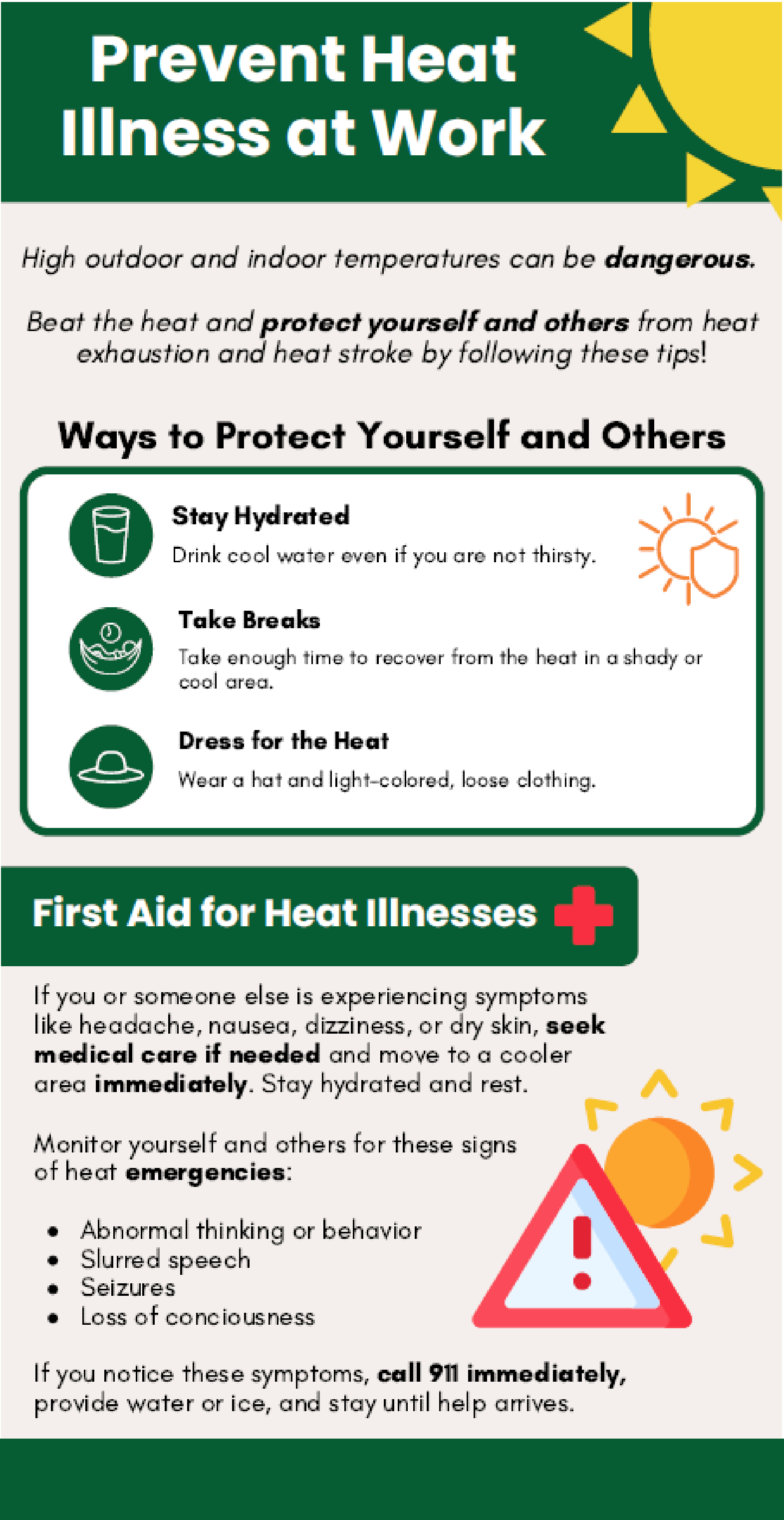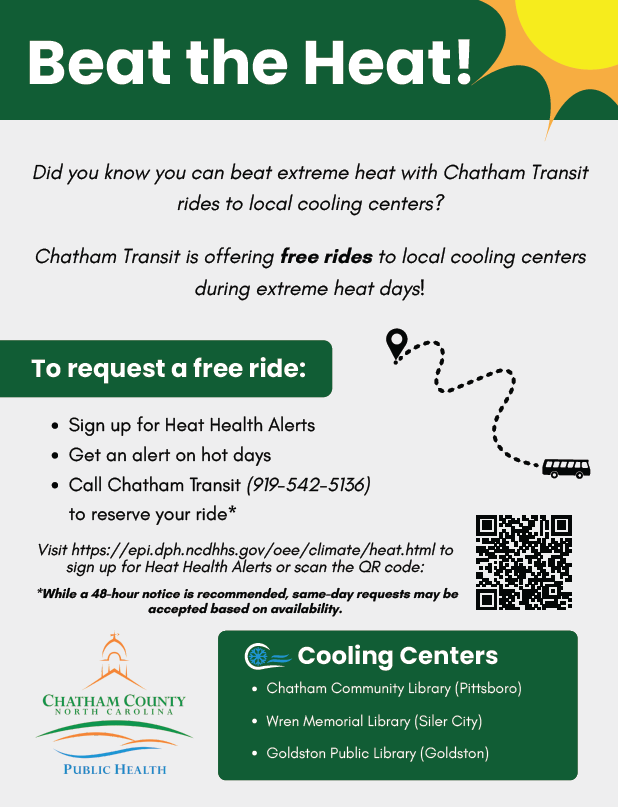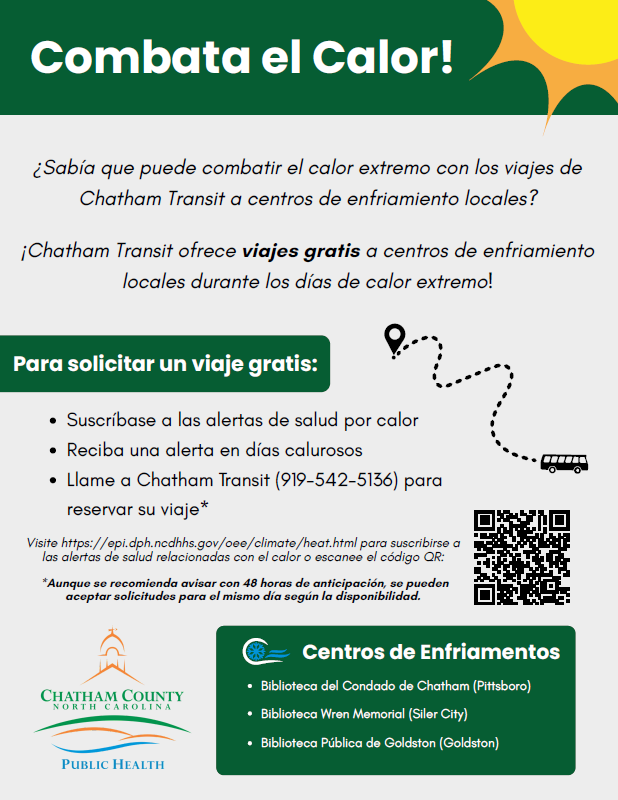Beat the Heat: Staying Safe When Temperatures Rise
go.ncsu.edu/readext?1083880
en Español / em Português
El inglés es el idioma de control de esta página. En la medida en que haya algún conflicto entre la traducción al inglés y la traducción, el inglés prevalece.
Al hacer clic en el enlace de traducción se activa un servicio de traducción gratuito para convertir la página al español. Al igual que con cualquier traducción por Internet, la conversión no es sensible al contexto y puede que no traduzca el texto en su significado original. NC State Extension no garantiza la exactitud del texto traducido. Por favor, tenga en cuenta que algunas aplicaciones y/o servicios pueden no funcionar como se espera cuando se traducen.
Português
Inglês é o idioma de controle desta página. Na medida que haja algum conflito entre o texto original em Inglês e a tradução, o Inglês prevalece.
Ao clicar no link de tradução, um serviço gratuito de tradução será ativado para converter a página para o Português. Como em qualquer tradução pela internet, a conversão não é sensivel ao contexto e pode não ocorrer a tradução para o significado orginal. O serviço de Extensão da Carolina do Norte (NC State Extension) não garante a exatidão do texto traduzido. Por favor, observe que algumas funções ou serviços podem não funcionar como esperado após a tradução.
English
English is the controlling language of this page. To the extent there is any conflict between the English text and the translation, English controls.
Clicking on the translation link activates a free translation service to convert the page to Spanish. As with any Internet translation, the conversion is not context-sensitive and may not translate the text to its original meaning. NC State Extension does not guarantee the accuracy of the translated text. Please note that some applications and/or services may not function as expected when translated.
Collapse ▲The Heat is On –
As we move into the warmer months of the year, many of us look forward to long summer days filled with backyard barbecues, outdoor events, and time at the lake or pool. While summer offers plenty of opportunities to enjoy the season, it’s important to recognize when the heat becomes dangerous.
North Carolina is already experiencing an increase in high heat days, and that number is projected to rise significantly over the next 30 years. As temperatures soar, the combination of extreme heat and high humidity can pose serious health risks—especially for vulnerable populations such as older adults, young children, and those who work outdoors.
Staying informed about heat forecasts and knowing how to prepare can help prevent serious heat-related illnesses and keep everyone safe during the hottest parts of the year.
Staying Safe in Extreme Heat
- Stay Hydrated
Drink plenty of water throughout the day, even if you don’t feel thirsty. If being active or working up a sweat, have a sports drink on hand to replenish electrolytes. Avoid both alcohol and caffeine, which can dehydrate you. - Limit Outdoor Activities
Avoid strenuous activity during the hottest part of the day, typically between 11:00 a.m. to 4:00 p.m. If you must be outdoors, take frequent breaks in the shade or indoors. - Use Air Conditioning
Spend time in air-conditioned spaces when possible, particularly throughout the hottest parts of the day. If you don’t have AC at home, visit public places like libraries or cooling centers during high heat days. In Chatham County, all of our public libraries operate as cooling centers. Alternatively, Chatham County Parks and Recreation offers a misting machine for a quick cool-down at Southwest District Park and Pittsboro provides a splash pad for children at Knight Farm Community Park. Know which option is closest to you and if necessary, make plans on how to get there on extreme heat days. - Dress for the Weather
Wear lightweight, loose-fitting, and light-colored clothing. A wide-brimmed hat and sunglasses can help protect you from the sun. - Check on Vulnerable Neighbors
Make sure family, friends, and neighbors, especially older adults or those with medical conditions, are staying cool and hydrated.
Watch for Warning Signs of Heat Illness
Knowing the symptoms of heat-related illnesses and the steps to take when they are identified can save lives:
- Heat Cramps:
- Symptoms: Heavy sweating, muscle cramps or spasms (often in the legs or abdomen)
- Response: Rest in a cool place out of the sun, drink water or a sports drink, and avoid strenuous activity for several hours
- Heat Exhaustion:
- Symptoms: Heavy sweating, fast & weak pulse, nausea, weakness, thirst, dizziness, headache, irritability
- Response: Move to a cooler place, loosen clothing, sip water, and apply cool compresses, take a cool bath/shower, seek medical attention if symptoms don’t improve within an hour of rest and fluids or if condition worsens
- Heat Stroke (Emergency Situation):
- Symptoms: Hot dry skin, confusion, loss of consciousness, rapid pulse, body temperature of 103°F or higher
- Response: Call 911 immediately. Move the person to a cooler location and try to lower body temperature with cool wet cloths, ice packs, or a bath, but do not give fluids if they are unconscious
*Sunburn: High heat and humidity may slightly increase the chance of sunburn, but the primary factor is the intensity of UV radiation. While not directly caused by heat, sunburn impairs the body’s ability to shed excess heat and can lead to dehydration, and if unaddressed may be a precursor to further heat related illness.
- Symptoms: Redness, pain or tenderness, swelling, headache, nausea, vomiting, chills, fatigue, dizziness, blisters (in severe cases), and peeling (after a few days)
- Response: Move to a shaded or indoor area, apply cool damp cloths, take a cool (not cold) shower, gently apply aloe vera or moisturizing lotion, drink plenty of hydrating fluids
Keeping Chatham Cool
Sign up for the Heat Health Alert System to receive notifications when forecasted temperatures may reach hazardous levels. Pay close attention to alerts and plan ahead when extreme heat is expected.
Prepare a Heat Wave Emergency Kit with essential items such as bottled water, electrolyte drinks or tablets, cooling towels, a battery-operated fan, sunscreen, and a thermometer to monitor indoor temperatures. This kit can be especially useful during power outages or for individuals with limited mobility.
Make a plan for your household to stay safe during high heat days. Identify the coolest rooms in your home and develop a transportation plan in case you need to reach a cooling center. In Chatham County, all three public library branches serve as designated cooling centers during periods of extreme heat, providing a safe, air-conditioned space for relief.
Chatham Transit is also offering free transportation to cooling centers during extreme heat days. It is recommended to provide at least 48 hours’ notice when scheduling a ride, which is why signing up for Heat Health Alerts can be especially helpful. While same-day transportation requests may be accommodated based on availability, planning ahead is strongly encouraged. Call (919) 542-5136 to reserve your ride with Chatham Transit.
Keep a list of family members, neighbors, or others in your community who may need assistance and plan to check in on them. Don’t forget to make arrangements for pets or livestock, who are also vulnerable to extreme temperatures.
Chatham Community Library
- Location:
197 NC Hwy 87 N
Pittsboro, NC 27312
Phone: 919-545-8084 - Hours:
Monday – Thursday: 9 a.m. – 8 p.m.
Friday: 9 a.m. – 6 p.m.
Saturday: 9 a.m. – 5 p.m.
Sunday: CLOSED
Wren Memorial Library
- Location:
500 North 2nd Avenue
Siler City, NC 27344
Phone: 919-742-2016 - Hours:
Monday: 10 a.m. – 8 p.m.
Tuesday – Friday: 10 a.m. – 6 p.m.
Saturday: 9 a.m. – 5 p.m.
Sunday: CLOSED
Goldston Public Library
- Location:
9235 Pittsboro-Goldston Road
Goldston, NC 27252
Phone: 919-898-4522 - Hours:
Monday, Tuesday, Wednesday: 10 a.m. – 6 p.m.
Thursday: 10 a.m. – 8 p.m.
Friday: 10 a.m. – 5 p.m.
Saturday and Sunday: CLOSED
Additional Resources:
Summer Heat Emergency Data and Prevention Tips
This page, provided by the North Carolina Department of Health and Human Services, offers resources to help residents stay safe during extreme heat. It features a Heat Health Alert System that sends email notifications when forecasted heat index levels become hazardous, with sign-up options in both English and Spanish. It also provides bilingual resources on safety toolkits, and tips for staying cool.
Chatham County Heat Action Plan
This document presents a comprehensive overview of Chatham County’s actions in response to high temperatures and heat waves. It provides a county-level response plan for extreme heat events, as well as longer- term management strategies for coping with heat. Within Chatham County, the Chatham County Emergency Management and Public Health Department are the lead agencies for developing and implementing the County’s response to adverse weather events, including extreme heat.
Heat Stress Disorders
The NC State Extension publication on heat stress disorders explains how excessive heat and humidity can impair the body’s ability to cool itself, leading to conditions such as sunburn, heat cramps, heat exhaustion, and heat stroke. It outlines their symptoms, risk factors, and practical prevention tips, as well as first aid steps for treating heat-related illnesses. It emphasizes hydration, proper clothing, and avoiding peak heat as key to staying safe, especially during outdoor work or recovery efforts.
Dealing with Heat Stress in Livestock and Pets
This article from Moore County Extension offers tips for preventing heat stress in livestock and pets during North Carolina’s hot, humid summers. The article offers key advice on prevention and responses as well as what signs to look for. Cattle, horses, and even pets are all at risk when temperatures rise.
Make the right call:
Always call 911 in the event of a heat-related emergency. Timely medical intervention can save lives, especially during periods of extreme heat. Planning ahead is key to staying safe—monitor weather alerts, prepare your home and emergency supplies, stay hydrated, and know where to go if you need to cool down. Whether it’s visiting a cooling center, staying in shaded or air-conditioned areas, or limiting outdoor activities during peak heat hours, taking steps to stay cool can help prevent serious health risks.









